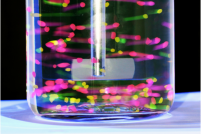We are investigating the use of 3D encapsulating hydrogel biomaterials for human stem cell (hSC) bioprocessing. We address the principal requirements for 3D suspension bioprocessing of hSCs using semi-synthetic hydrogel milieus, mainly by developing methodologies for straightforward cell inoculation into microgels, in situ self-renewal and differentiation in a microgel culture system, and mild cell recovery into a solution phase.
We plan to address the principal requirements for 3-D suspension bioprocessing of human stem cells in hydrogel microcarriers (microgels) made from semi-synthetic biomaterials. We are developing techniques for straightforward cell inoculation into the microgels, in situ self-renewal and differentiation in the microgel suspension culture system, and mild cell recovery into a solution phase.
Suspension culture for stem cells
Human pluripotent and multipotent stem cells (hSC) are an excellent renewable source of therapeutic cells. Even as scientists uncover precisely how to manipulate hSC cultures toward directed pathways of differentiation or self-renewal, their routine commercial and clinical applications will still require cultivation and bioprocessing efficiency that cannot be provided by conventional adherent cell culture technologies. The development of scalable methodologies for handling hSC necessitates an approach premised on the use of three dimensional (3-D) suspension cultures that are readily adaptable to large-scale bioreactors. In this context, hydrogel biomaterials may offer a solution for developing 3-D bioprocessing technologies for stem cells that can be applied in commercial clinical settings. In our laboratory we are working on a technological foundation for encapsulating hydrogel biomaterials to be used as a routine, efficient, and scalable solution for hSC bioprocessing. We adapt our semi-synthetic hydrogel biomaterials for creating cell-laden microcarriers that can be grown in suspension culture. Our results support the proposed scheme, showing that microgel cell inoculation and biomaterial-based methods for controlling cell proliferation, differentiation, and cell-to-cell interactions are feasible in the context of a simple yet scalable stirred bioreactor. While there are still many challenges in this regard, a successful approach to the suspension culture of hSC could lay the foundation for overcoming one of the most enduring challenges in applying stem cells in regenerative medicine.
Relevant Publications
No publications found.
